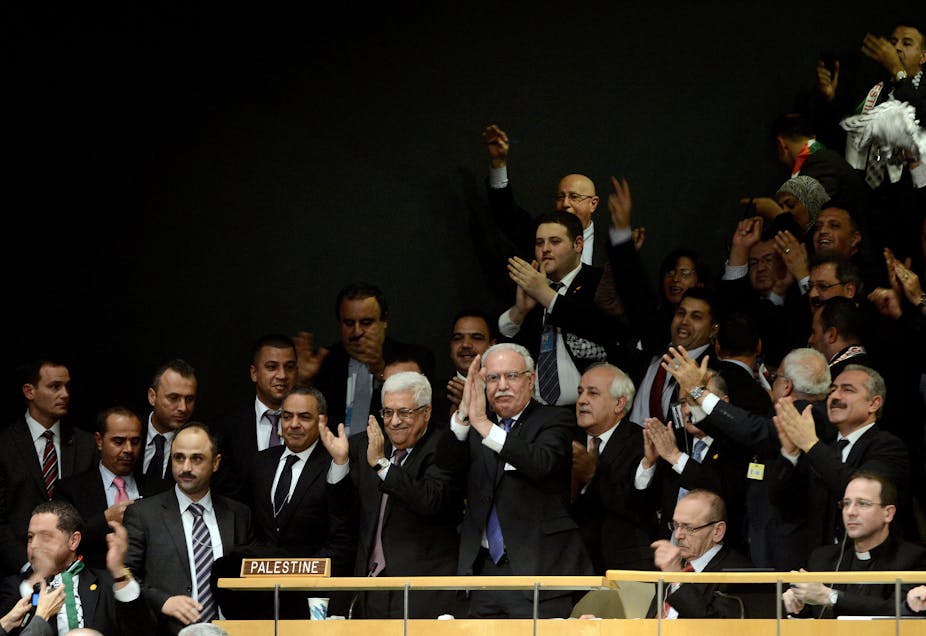The road of history is a pot-holed one. But that doesn’t mean, despite the crashes and stutters, that we don’t eventually get past them. The UN vote over upgrading the Palestinians to non-member observer status within its claims to the 1967 borders is one example of that. The vote was passed today with the 193-member assembly voting 138-9 and 41 abstentions.
By no means does the vote suggest that Palestinian sovereignty is a foregone conclusion. Israel has done its best to curtail such efforts over the years since the Oslo Peace Process, and it does have a group of diminishing allies in that quest.
The Palestinians have not done themselves any favours in the broader quest for statehood either. These problems go back to 1947. Israel, in one of history’s cruel tricks, might be a Goliath presiding over matters of territory and control, but there are deadly divisions in their opponent’s effort to seek recognition.

Hamas, for one, refuses to compromise with Israel, seeing it as an entity that deserves obliteration. For that reason, any bargain on statehood that is ever struck with Israel is potentially sunk before it even sails. Israel reciprocates with a crippling blockade and retaliatory strikes against the Gaza strip for their limp efforts at military prowess, though there are a few suggestions that compromise might be possible – in the future. Fatah, led by President Mahmoud Abbas, has been sidelined in the broader debate, and will find hope in this vote.
In every other sense, Hamas, with its crude but cunning strategy of exposing Israeli heavy handedness even as it fires missiles into Israel, has left their opponents stranded. The more moderate Palestinian voices have had a lesser role to play of late, and an argument can well be made that the vote will inspire the more reticent to take a stand.
As the notable Israeli paper Haaretz observed:
Israel will suffer a humiliating political defeat and find itself isolated along with the United States, Canada, Micronesia, the Marshall Islands and, at best, Germany and the Czech Republic.
Australia chose to abstain from the vote, after prime minister Julia Gillard, who wished to vote against statehood, faced pressure from a rebellious backbench.
This position certainly had its adherents – there were 41 in all. UK Foreign Secretary William Hague expressed the view that, while not opposing the upgrade of Palestinians to non-member observer status, pre-conditions were necessary. Among them will have to be a Palestinian assurance not to sue Israel for war crimes through the International Criminal Court. He wanted confirmation that:
Up until the time of the vote itself, we will remain open to voting in favour of the resolution if we see public assurances by the Palestinians on these points.
The vote is not likely to jeopardise Israel’s relations with other countries in the EU, or even those who abstained. There will be much theatre, and there will be indignation.
The truth is that an abstention, in trying to be on the “right side of history” is a meek act, but it has its role in international politics.
There is also another reality here – that the Palestinian-Israel matter is not going to be resolved in a forum such as the UN. Benjamin Netanyahu and his colleagues may wish to personalise the UN antics as a personal defeat, but that resolution will lie elsewhere.
Politics is the art of the possible, and possibilities for preventing Palestinian sovereignty from becoming a reality are rapidly diminishing. Israel’s efforts to put conditions on the attainment of that goal are becoming less feasible over time. The abstention option for some countries, while it might be treated as a “half-way” house of measures, is simply a reflection of the complex range of issues at stake.
That complexity is reflected by one cold reality: November 29 marks the 65th anniversary of the UN Partition Resolution of 1947. A “two states for two peoples” solution was certainly mooted at that point, for all its problems, but it was not something that was acceptable for all parties.
Former Australian prime minister John Howard has weighed into the debate, suggesting that his contemporary Julia Gillard “lacked the courage of her convictions”.
That said, the to and fro within the Labor caucus suggests that the debate was lively, from a “yes” vote posed by Andrew Leigh to the “no” stance of the Prime Minister. In the end, the heavies of foreign policy – Gareth Evans and Bob Carr - lobbied for an abstention. They can hardly be accused of being too enthusiastic about Hamas.
Carr, having himself co-founded the group “Labor friends of Israel”, has made it clear that, “as a friend of Israel, at times you’ve got to save it from itself”.
The point here is that all parties have to save themselves – and that might well be in the offing with this UN measure.

